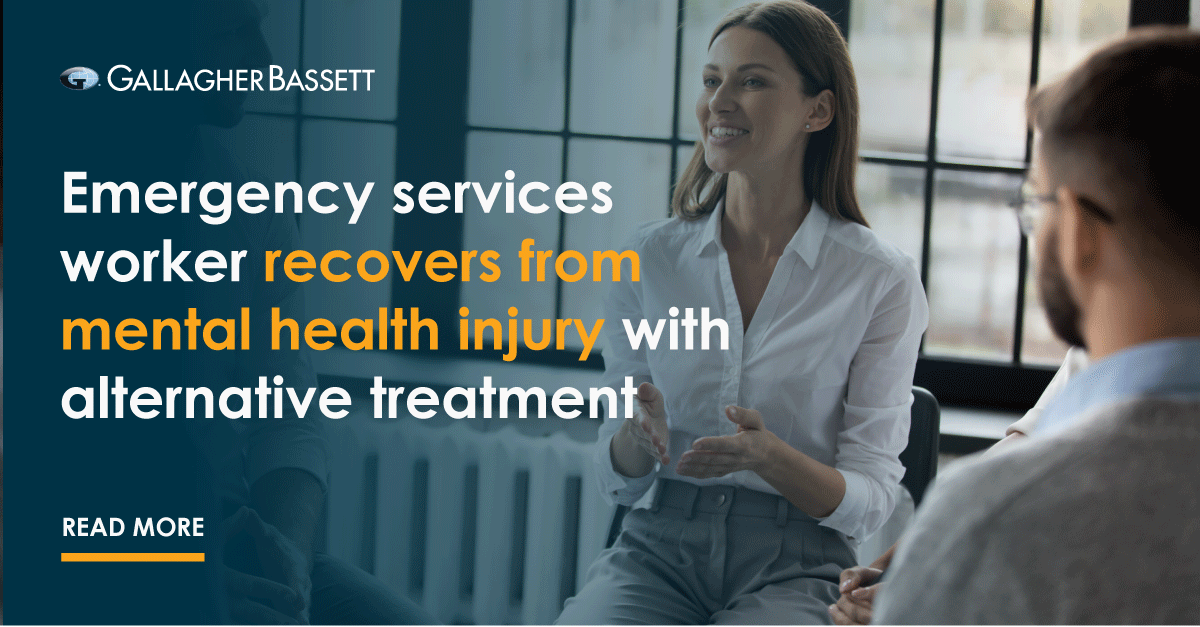Alternative Treatment improving mental health outcomes

Yoga proved the most effective treatment for this employee, bringing a speedy recovery.
Many workers experience symptoms of mental illness that impact their ability to function,
Socialise and manage finances. They also report a loss of confidence and hope in relation to their workplace injury and have difficulty engaging in activities outside the household. GB has also found that the gap in time between treatment sessions, or the length of wait-time to access clinical treatment was playing a key role in their recovery, or lack thereof.
To mitigate this, Gallagher Bassett implemented an Alternative Therapies Program to improve access to alternative treatment options for workers with psychological injury. This program has been designed to empower workers to have direct input on their recovery plan, assist with building structure and meaningful activity in their lives, and positively impact recovery from a biopsychosocial perspective.
We worked collaboratively with injured workers and their treatment providers to explore services that could benefit their recovery. For that reason, there was a wide range of services approved in the program, recognising the importance of providing injured workers with greater choice and control over their recovery.
This program has demonstrated that activities such as yoga, meditation, Pilates, or phone applications helped injured workers;
- Apply techniques they learn in counselling in ‘real-life' scenarios
- Increased the amount of therapeutic contact time
- Provided structure, discipline, and purpose
- Create a healthier routine, and;
- Engage in recovery activities earlier
The testimonials received from the workers centred on 3 consistent themes:
- Empowerment: The alternate therapies provided workers with the ability to make decisions about their treatment and engage in self-directed recovery services.
- Grounding: Alternative therapies provided workers with the opportunity to be in the moment as opposed to reliving the past or worrying about the future.
- Confidence: Workers reported feeling more confident through being able to attend classes, achieve goals, and complete programs. Their goals built momentum and positively impacted other areas of the individual’s life, in addition to recovery and return to work.
By having choices and additional support options, GB can provide true client-centred care and support workers' recovery from a biopsychosocial perspective. Not only are we are encouraging collaborative conversations between stakeholders, we are also building better relationships with workers and the wider community.
Case Study
Thinking outside of the box brought the right treatment for a mental health injury.
Ellen*, an emergency services worker suffered from anxiety and post-traumatic stress disorder, the result of accumulated exposure to numerous critical incidents during her employment. After receiving her diagnosis in the summer of 2020, the complexity of Ellen’s injury was evident due to her prolonged exposure and also needing to return to the position that can bring additional trauma and stress.
During a Case Conference with her and her GP, it was recommended an alternative course of treatment consisting of yoga and meditation. In following the patient-centred clinical method, our Mobile RTW Specialist listened to Ellen’s view of this recommendation, confirming she believed it would benefit her recovery. She wholeheartedly wished to embark on the treatment plan advised by her doctor.
GB supported this plan and Ellen commenced regular yoga and meditation practice. She soon identified this was dramatically improving her mood and mindset, facilitating her recovery and helping her find more satisfaction in life. Within six months of lodging her claim, Ellen returned to work on a part-time basis. She had actively participated in the return-to-work planning process and felt ready to be back on the job. Ultimately, she achieved a much faster return to work than would typically be expected for such a complex condition. Further, yoga greatly assisted her in dealing with the continued stress of her job.
In light of the trauma faced by emergency services personnel and the pervasiveness of mental health conditions in general, employers should consider all the treatment options. For many employees, alternative treatment modalities can bring both physical and mental benefits that dovetail into improved overall wellbeing. That certainly proved the case for this Ellen. Her outcome speaks for itself, and she believes that she has yoga to thank for her successful, tailored recovery and return to work.
If you’re interested in learning more about GB's Government Services, reach out to Emma Hosking.
Emma commenced her career with ReturnToWork South Australia in 1993. Emma joined Gallagher Bassett in 2013 as GB’s Scheme Account Manager, South Australia, helping to lead GB’s successful South Australian start-up. Since then, Emma has been involved in many large government transition projects, including leading the development of GB’s award-winning Northern Territory operation and helping establish GB’s government operations for Comcare, Norfolk Island, icare NSW, and the Tasmanian DPFEM. Emma was a keynote speaker at the 2021 PIEF Conference, where she shared her experience and examined the importance of personalisation in contemporary government insurance schemes.

